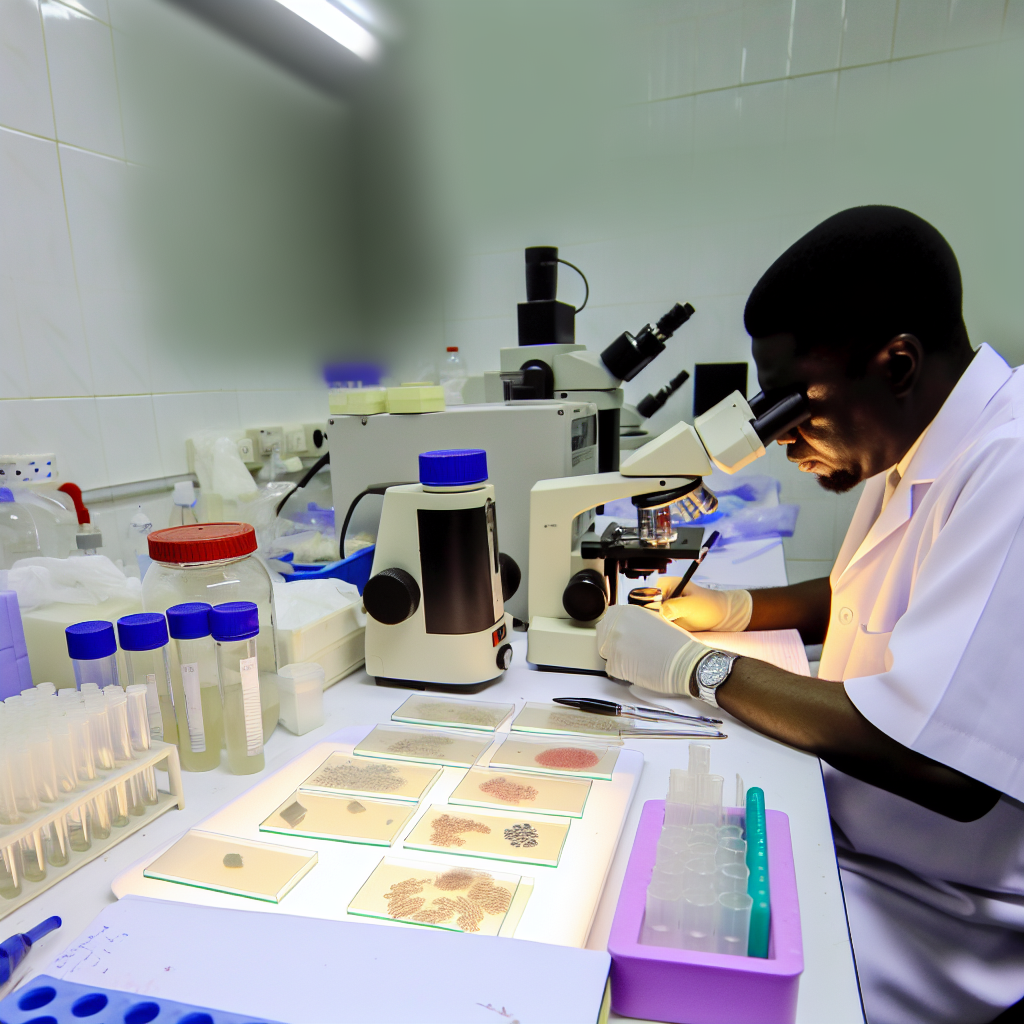Introduction
Anatomical pathology is the branch of medicine that deals with the diagnosis of disease based on the analysis of tissues and cells.
It plays a crucial role in healthcare by providing insights into the underlying causes of illness, guiding treatment decisions, and monitoring disease progression.
In Nigeria, anatomical pathology faces numerous challenges that hinder its effectiveness and impact on patient care.
Challenges Facing Anatomical Pathology in Nigeria
- Limited access to modern diagnostic technologies, such as immunohistochemistry and molecular testing, hampers accurate diagnosis.
- Inadequate training and professional development opportunities for pathologists and laboratory technicians lead to suboptimal services.
- Poor infrastructure and lack of standardized protocols for sample handling and processing compromise the quality of results.
- Shortage of pathologists and trained personnel in the field limits the capacity to meet growing healthcare demands.
- Limited funding and resources allocated to pathology departments affect the availability of essential supplies and equipment.
- Inconsistent regulatory framework and enforcement mechanisms result in variability in quality assurance and accreditation standards.
- Insufficient public awareness and education about the importance of pathology in disease diagnosis and management contribute to underutilization of services.
- Challenges related to data management, storage, and retrieval impede the timely communication of results to clinicians and patients.
Overall, addressing these challenges is essential to improve the quality of anatomical pathology services in Nigeria and enhance patient outcomes.
Challenges in Anatomical Pathology in Nigeria
In Nigeria, one of the major challenges facing anatomical pathology is the lack of adequate infrastructure.
This includes:
Limited Access to Necessary Equipment and Technology
Many laboratories in Nigeria lack the basic equipment and technology needed to perform accurate diagnostic tests.
This hinders the ability of pathologists to provide timely and precise results to patients.
Shortage of Laboratory Space for Processing Samples
Due to the limited space available in laboratories, there is often a backlog of samples waiting to be processed.
This can lead to delays in diagnosis and treatment, negatively impacting patient outcomes.
Impact on the Efficiency and Accuracy of Diagnostic Services
The lack of infrastructure in anatomical pathology has a direct impact on the efficiency and accuracy of diagnostic services.
Without access to proper equipment and adequate space, pathologists may not be able to provide reliable and timely results.
Addressing the infrastructure challenges in anatomical pathology in Nigeria is crucial to improving the quality of healthcare services and outcomes for patients in the country.
One of the major challenges facing anatomical pathology in Nigeria is the insufficient training and education for pathologists.
Lack of specialized training programs in anatomical pathology
Pathologists in Nigeria often lack access to specialized training programs that focus specifically on anatomical pathology.
This results in a gap in knowledge and skills required to effectively practice in this field.
Inadequate continuing education opportunities for professionals
Another issue is the lack of sufficient continuing education opportunities for pathologists in Nigeria.
Continuous learning and skills development are crucial in a rapidly evolving field like anatomical pathology.
Resulting in limited expertise and skill development in the field
These challenges lead to limited expertise and skill development among pathologists in Nigeria.
This hinders their ability to provide accurate diagnoses and deliver high-quality patient care.
Gain More Insights: Radiology Safety Protocols in Nigerian Clinics
Inadequate funding and resources
One of the major challenges facing anatomical pathology in Nigeria is inadequate funding and resources.
The limited government budget allocation to the healthcare sector has a direct impact on the availability of funds for anatomical pathology services.
With a small budget, it becomes difficult for laboratories to purchase essential materials and tools needed for accurate diagnosis and treatment.
Importing necessary materials and tools also poses a significant challenge due to the high costs involved.
The exchange rate, shipping fees, and import duties contribute to the financial burden faced by laboratories in Nigeria.
As a result, many facilities struggle to afford these items, leading to delays in providing timely and accurate pathology services.
The financial constraints resulting from inadequate funding and resources further exacerbate the challenges faced by anatomical pathology in Nigeria.
This limits the capacity for laboratories to invest in modern equipment, training programs, and quality control measures.
Without sufficient resources, it becomes challenging to improve services, meet international standards, and enhance patient care.
Explore Further: How to Prepare for Anatomy Exams in Nigerian Universities
Significant Challenges in Anatomical Pathology
One of the significant challenges facing anatomical pathology in Nigeria is poor data management and record-keeping systems.
Inefficient or Non-Existent Digital Storage of Patient Data
The lack of proper digital storage systems in many healthcare facilities in Nigeria poses a significant challenge in managing patient data efficiently.
With the absence of digital storage, patient information is often stored in physical files.
This makes it challenging to access, update, or share the data with relevant healthcare providers.
Difficulty in Accessing and Retrieving Medical Records
Due to the inadequate digital storage systems, healthcare professionals in Nigeria often face challenges in accessing and retrieving medical records when needed.
This can lead to delays in diagnosing and treating patients, as critical information may not be readily available.
Compromising Patient Care and Follow-up Procedures
Poor data management and record-keeping systems can compromise patient care and follow-up procedures in anatomical pathology.
Without easy access to accurate and up-to-date medical records, healthcare providers may struggle to provide timely and effective treatment.
This leads to potential risks for patients.
Transform Your Career with Expert Guidance
Get personalized mentorship consulting that’s tailored to your unique path. Our expert advice is actionable and exclusive.
Get StartedUncover the Details: Microbiology Journals and Publications in Nigeria
Lack of standardized guidelines and regulations
One of the major challenges facing anatomical pathology in Nigeria is the lack of standardized guidelines and regulations.
This poses a significant problem as it leads to inconsistencies in practices among healthcare facilities.
Without clear guidelines for conducting anatomical pathology tests, there is a risk of variability in diagnoses and treatment recommendations.
- Absence of clear guidelines for conducting anatomical pathology tests
- Inconsistent practices among healthcare facilities
- Resulting in variability in diagnoses and treatment recommendations
Healthcare facilities in Nigeria may have different protocols for conducting anatomical pathology tests, which can result in discrepancies in the interpretation of test results.
This lack of standardization can lead to misdiagnoses and inappropriate treatment plans for patients.
Moreover, the absence of clear guidelines and regulations for anatomical pathology in Nigeria can hinder the quality and accuracy of diagnostic services.
Healthcare providers may not have a common standard to follow, leading to confusion and potential errors in the diagnosis and treatment of diseases.
Impact of inconsistent practices
The inconsistent practices among healthcare facilities in Nigeria can have serious consequences for patients.
Variability in diagnoses can result in delays in treatment, unnecessary procedures, and even incorrect management of diseases.
Patients may not receive the appropriate care they need if there is no standardization in the practice of anatomical pathology.
Furthermore, the lack of standardized guidelines and regulations can also affect the overall quality of healthcare services in Nigeria.
Without clear protocols for conducting anatomical pathology tests, there is a risk of compromised patient safety and outcomes.
Healthcare providers may not adhere to best practices, leading to suboptimal care for patients.
Recommendations for improvement
To address the challenges of lack of standardized guidelines and regulations in anatomical pathology in Nigeria, it is essential to develop comprehensive guidelines that outline best practices for conducting tests.
These guidelines should be based on international standards and tailored to the specific context of the Nigerian healthcare system.
Healthcare facilities should also invest in training and education for healthcare providers to ensure adherence to standardized guidelines.
Continuous monitoring and evaluation of practices can help identify areas for improvement and ensure the delivery of high-quality anatomical pathology services to patients.
Collaboration among healthcare stakeholders, including government agencies, professional organizations, and healthcare providers, is crucial in developing and implementing standardized guidelines for anatomical pathology in Nigeria.
By working together, stakeholders can promote consistency in practices and improve the overall quality of healthcare services in the country.
Find Out More: Exploring Cutting-Edge Medical Disciplines Revolutionizing Healthcare in Nigeria

Limited public awareness and understanding
One of the major challenges facing anatomical pathology in Nigeria is the limited public awareness and understanding of the field.
This lack of knowledge about the role and importance of anatomical pathology creates barriers to effective healthcare delivery and hinders disease management.
With low public knowledge about anatomical pathology, many people in Nigeria may not understand the vital role that pathologists play in diagnosing and treating diseases.
This lack of awareness can lead to delayed or incorrect diagnoses, which can have serious implications for patient outcomes.
Furthermore, misconceptions and stigma surrounding testing and diagnoses in anatomical pathology can further exacerbate the challenges faced by practitioners in Nigeria.
Some individuals may be reluctant to undergo testing due to fears or misconceptions about the procedures involved, leading to delayed diagnoses and treatment.
Another significant issue caused by limited public awareness is the impediment to early detection and treatment of diseases.
Without understanding the importance of regular screenings and diagnostic tests, individuals may not seek medical attention until symptoms become severe, resulting in poorer prognosis and outcomes.
In order to address these challenges, it is crucial to implement public education and awareness campaigns to increase knowledge about anatomical pathology among the Nigerian population.
By dispelling myths and misconceptions and highlighting the importance of timely diagnoses, public health initiatives can empower individuals to take control of their health and seek appropriate medical care.
Additionally, healthcare professionals and policymakers must work together to improve access to diagnostic services and promote the value of anatomical pathology in disease management.
By making testing and diagnostic services more widely available and increasing the visibility of pathologists in healthcare settings, the barriers created by limited public awareness can be overcome, ultimately improving health outcomes for the Nigerian population.
One major challenge facing anatomical pathology in Nigeria is poor coordination and collaboration among healthcare professionals.
This issue is multifaceted and impacts various aspects of patient care and treatment.
Lack of multidisciplinary approach to patient care
One of the key reasons for the lack of coordination is the absence of a multidisciplinary approach to patient care.
Healthcare professionals often work in silos, focusing on their specific areas without considering the holistic needs of the patient.
Limited communication and sharing of information between specialists
Another contributing factor to poor coordination is the limited communication and sharing of information between specialists.
Pathologists, radiologists, oncologists, and other professionals need to exchange essential data to make informed decisions about patient diagnosis and treatment.
Hindering comprehensive diagnosis and treatment planning
As a result of these challenges, comprehensive diagnosis and treatment planning are hindered.
Without collaboration and communication, healthcare professionals may miss crucial information that could impact patient outcomes.
This lack of coordination can lead to delays in diagnosis, incorrect treatment plans, and suboptimal patient care.
To address these challenges, there is a need for improved communication and collaboration among healthcare professionals in Nigeria.
Implementing multidisciplinary team meetings, fostering a culture of information sharing, and utilizing technology for seamless data exchange can help enhance coordination and ultimately improve patient care in anatomical pathology.
Key Challenges in Anatomical Pathology in Nigeria
The key challenges facing anatomical pathology in Nigeria include inadequate funding.
There is a shortage of skilled personnel in this field.
Outdated equipment further complicates the situation.
Moreover, poor infrastructure poses significant obstacles.
Addressing these issues is crucial for improved healthcare outcomes.
Accurate pathology results are vital for proper diagnosis and treatment.
The government, healthcare professionals, and researchers must collaborate.
Working together is essential to overcome these obstacles in anatomical pathology.
Additional Resources
Epidemiological trends and treatment abandonment of paediatric …
Surgery in Nigeria | Global Health | JAMA Surgery | JAMA Network




